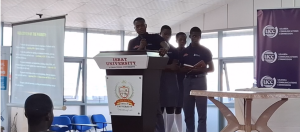Lesson 2: Forming Your Team & Assigning Roles

Forming Your Team & Assigning Roles
Introduction: You Can’t Win Alone
A great idea is just the start. To turn that idea into a winning project, you need a great team. But a team is more than just a group of friends; it’s a well-organized unit where everyone knows their position and what they need to do to score. This lesson will help you build your “Dream Team.”
By the end of this lesson, your team will have:
- Identified the key roles needed for your project’s success.
- Assigned a primary role to each team member based on their strengths.
- Created a “Team Charter” to keep everyone accountable and focused.
- Learned how to communicate effectively and solve problems together.
Part 1: The Football Team Analogy
Every Player Has a Position
Think of your ICT competition team like a football team playing in the AFCON finals. You wouldn’t put all 11 players as strikers, right? You need defenders, midfielders, a goalkeeper, and a captain. Each position has a specific job, but they all work together for one goal: to win.
In your project, you also need different “positions”:
- The Captain (Project Manager): Keeps the team organized and on schedule. Makes sure everyone is communicating.
- The Striker (Lead Developer): The main coder who builds the core functions of the app. They are focused on scoring the “technical goals.”
- The Midfielder (UI/UX Designer): Controls the flow of the game. They design how the app looks and feels, making it easy and enjoyable for the user to “play” with.
- The Defender (Researcher & Tester): Protects the team from mistakes. They research the problem, find content, and test the app to find bugs before the judges do.
- The Goalkeeper (Pitch Master): The final line of defense and the one who presents the team’s work with confidence. They save the team by delivering a powerful pitch.
Part 2: Defining Your Team’s Key Roles
While the football analogy is a good start, let’s get specific. Here are the essential roles for your ICT project. A small team might have members taking on more than one role.
The Essential Roles
- Project Manager (The Organizer): Are you good at making plans, tracking deadlines, and reminding people of their tasks? This is you. You create the to-do lists and make sure the project doesn’t fall behind.
- Lead Developer (The Builder): Do you love coding and solving technical puzzles? You will write the main parts of the app and help others when they get stuck with their code.
- UI/UX Designer (The Artist): Do you have a good eye for color, layout, and making things look beautiful and easy to use? You will design the screens, choose the colors, and create the icons.
- Researcher & Content Specialist (The Investigator): Are you good at finding information online, writing clearly, and understanding the user’s problem deeply? You will gather all the facts, write the text for the app, and become the expert on your topic.
- Pitch & Presentation Lead (The Storyteller): Are you a confident speaker who can get others excited about an idea? You will write the script for the pitch video, practice presenting, and be the main voice of the team.
Part 3: Your First Team Agreement
The best teams don’t rely on assumptions. They create a simple agreement, a “Team Charter,” so everyone is on the same page. This prevents future arguments.
Activity: Create Your Team Charter
On a piece of paper or in a shared document, answer these questions together:
- Team Name: What is your official team name?
- Our Project Goal: In one sentence, what are we trying to achieve?
- Team Roles: Who is assigned to each of the 5 key roles? (Write down the person’s name next to the role title).
- Communication Plan: How will we communicate? (e.g., “We will meet every Monday and Friday after school,” “We will use a WhatsApp group for quick updates.”)
- Decision Making: How will we make important decisions? (e.g., “We will vote, and the majority wins,” “The Project Manager makes the final call after listening to everyone.”)
- Conflict Resolution: What will we do if we disagree? (e.g., “We will involve our teacher/mentor to help us decide,” “We will take a 10-minute break and then discuss calmly.”)
Every team member should sign this document. It’s your contract with each other!
Your Next Mission
A well-organized team is a winning team. Your goal is to move from being a group of individuals to a unified force.
- Discuss the strengths of each person in your group. Be honest and positive!
- Assign the 5 key roles based on those strengths.
- Complete your “Team Charter” together and make sure everyone agrees to it.
Once you have your positions and your game plan, you’re ready for the next step in the competition!
Back to Phase 1 Page





